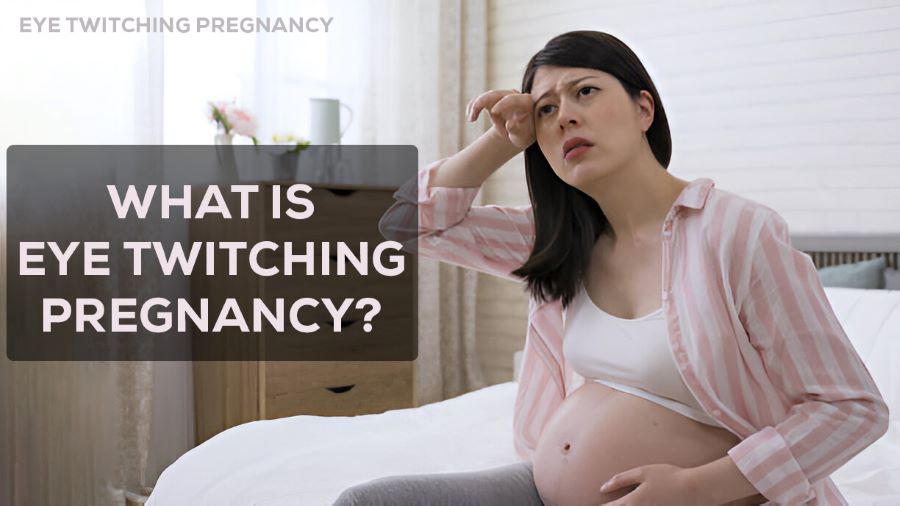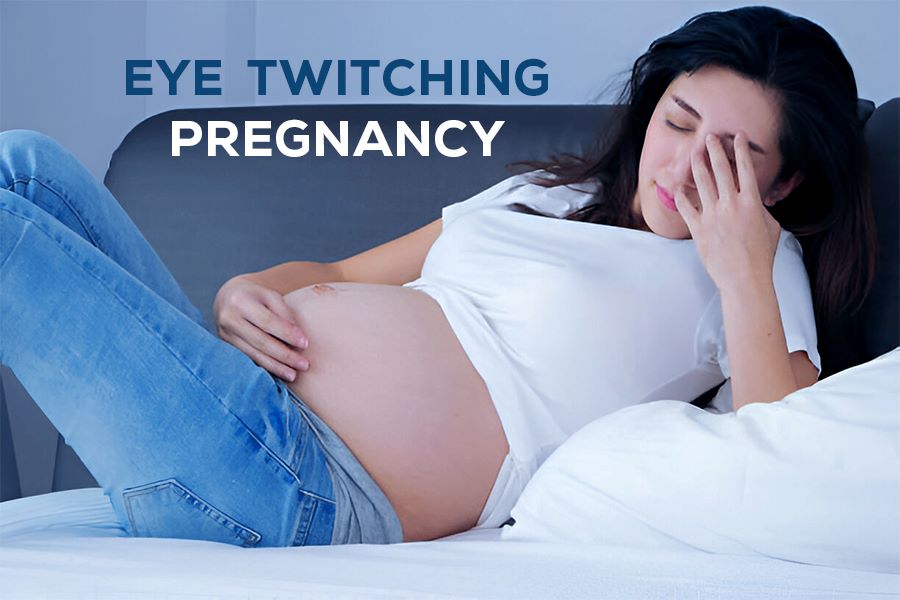Noticed a strange flutter in your eyelid during pregnancy? You’re not alone. For many moms-to-be, eye twitching pregnancy symptoms are an unexpected and often frustrating part of the journey. While it may feel alarming, it’s usually harmless—and surprisingly common.
This guide explores what causes eye twitching during pregnancy, how it feels, why it happens, and what you can do to manage it effectively. We’ll also break down the medical terms, real-life experiences, and when it’s time to see a doctor.
What Is Eye Twitching Pregnancy?
Eye Twitching Pregnancy refers to the involuntary spasms or flickering of the eyelid muscles that some pregnant women experience. It’s often described as a subtle fluttering or pulsing sensation in the upper or lower eyelid. While it might seem unusual, this symptom is usually harmless and tends to come and go without warning.
During pregnancy, the body goes through countless changes—hormonally, emotionally, and physically. These changes can lead to a few surprising symptoms, and one of them is eye twitching. This twitch can happen because of stress, lack of sleep, fatigue, or even nutrient deficiencies. Hormonal shifts—especially spikes in estrogen and progesterone—can affect how the nerves and muscles behave, which may lead to things like muscle spasms, including twitching around the eyes.
It’s important to remember that it’s usually not serious. It’s just your body’s way of reacting to all the changes it’s going through. However, if the twitching is persistent or comes with other unusual symptoms like facial numbness, vision changes, or pain, it’s a good idea to talk to a doctor.
So, in short: eye twitching during pregnancy is a fairly common and mostly harmless symptom that reflects the whirlwind of changes your body is managing.

Causes of Eye Twitching During Pregnancy
There’s no single cause of eye twitching pregnancy symptoms, but several common triggers can set it off:
1. Hormonal Changes
Pregnancy causes a surge in hormones, especially estrogen and progesterone. These shifts can affect how your nervous system functions, leading to spasms like eye twitching.
2. Fatigue
Sleep doesn’t always come easy during pregnancy, especially in the second and third trimesters. Tired muscles are more likely to twitch, especially around the eyes.
3. Stress and Anxiety
Emotional stress puts your body on high alert. Cortisol, the stress hormone, can increase muscle reactivity—leading to twitching. For many, eye twitching pregnancy symptoms flare up after a rough day or during moments of high anxiety.
4. Nutrient Deficiencies
Lack of magnesium, calcium, or B12 can lead to muscle spasms. If your prenatal diet is missing key nutrients, eye twitching might be a sign to adjust your intake.
5. Caffeine
A little coffee may help with pregnancy fatigue, but too much can overstimulate your nervous system. Caffeine is a known trigger for eye twitching pregnancy experiences.
6. Eye Strain
Spending hours on your phone or computer? Eye strain is another leading cause. During pregnancy, your eyes may be drier, making you more prone to twitching.
Types of Eye Twitching in Pregnancy
Not all eye twitches are the same. Understanding the type of twitch can help you treat it better.
-
Myokymia – Gentle fluttering of the eyelid. Common and harmless.
-
Blepharospasm – Stronger contractions that may close the eye.
-
Fatigue-induced twitching – Linked to lack of rest or sleep.
-
Dry eye twitching – Caused by hormonal changes reducing tear production.
How Eye Twitching Pregnancy Symptoms Fit Into the Bigger Picture
Holonyms
The eye is part of your face, which is part of your head, which responds to changes in blood flow, hormones, and stress during pregnancy. So that little eyelid twitch is often tied to a bigger picture.
Meronyms
Your twitch likely involves the orbicularis oculi muscle, facial nerves, and tear glands. These are the muscle and nerve components responsible for the twitch.
How to Manage Eye Twitching During Pregnancy
Most cases of eye twitching during pregnancy go away on their own. But if the flutter is bothering you, try these remedies:
1. Stay Hydrated
Dehydration can irritate your muscles and nerves. Drink plenty of water throughout the day.
2. Cut Down on Caffeine
Try limiting coffee, soda, or tea. Even decaf still contains some caffeine, which may trigger spasms.
3. Increase Magnesium and B12
Eat more leafy greens, nuts, bananas, and whole grains. Prenatal vitamins help, but food-based nutrients are often better absorbed.
4. Get More Rest
Make sleep a priority. Nap during the day if nighttime rest is interrupted. Restful eyes = calm eyelids.
5. Reduce Screen Time
Give your eyes a break. Follow the 20-20-20 rule: every 20 minutes, look at something 20 feet away for 20 seconds.
6. Try Warm Compresses
Applying a warm, damp cloth to the eye for a few minutes can help relax the eyelid muscles.
7. Practice Relaxation
Prenatal yoga, breathing exercises, and meditation can ease muscle tension and reduce eye twitching pregnancy symptoms caused by stress.
When to See a Doctor
Eye twitching is usually harmless—but not always. See your doctor if:
-
The twitching lasts longer than a few weeks.
-
You notice facial drooping or weakness.
-
There’s pain, redness, or swelling in or around the eye.
-
Your vision changes.
-
Twitching spreads beyond your eye.
Conditions like Bell’s palsy, blepharitis, or even neurological issues are rare but possible. Better safe than sorry.
Eye Twitching Pregnancy: Real-Life Reflections
One mom recalls, “My right eye twitched nonstop for a week during my second trimester. I thought I was just tired, but after I hydrated, reduced screen time, and eased up on coffee, it stopped.”

These real-life stories show how small changes in daily habits can make a big difference. Whether it’s staying hydrated, cutting back on caffeine, or taking short breaks to breathe and rest, these simple steps can ease discomfort and restore balance. Listening to your body doesn’t require anything fancy—just a little attention and care. Every twitch, flutter, or shift could be your body’s gentle reminder to prioritize yourself during this transformative time.
Another shared, “The twitch felt like a signal—like my body saying, ‘Hey, slow down.’ I started meditating for 10 minutes a day, and it helped.”
Common and Rare Attributes of Eye Twitching in Pregnancy
Common:
-
Stress and anxiety
-
Hormonal imbalance
-
Dehydration
-
Eye strain
-
Nutritional deficiency
Rare but Serious:
-
Bell’s palsy
-
Eye infections
-
Neurological conditions like multiple sclerosis
Frequently Asked Questions
Q1: Is eye twitching pregnancy a normal symptom?
Yes. It’s common and usually nothing to worry about.
Q2: Can stress trigger eye twitching in pregnancy?
Definitely. High stress levels are a top trigger.
Q3: Is eye twitching during pregnancy dangerous?
Not usually. If it comes with other symptoms, check with your doctor.
Q4: When is eye twitching most common in pregnancy?
Many moms report it during the second and third trimesters due to fatigue and hormone shifts.
Q5: Can magnesium help with eye twitching pregnancy symptoms?
Yes. Magnesium supports muscle and nerve health. Foods like spinach and almonds can help.
Keyword Clarity: Lexical, Semantic, and Contextual Use
Understanding how “eye twitching pregnancy” works linguistically helps you research it better.
-
Lexically: It refers to involuntary eye movement during pregnancy.
-
Semantically: Related terms include myokymia, blepharospasm, fatigue, and ocular nerves.
-
Synonyms: Eyelid twitching, fluttering eye, spasming eye.
-
Hypernyms: Pregnancy discomforts, neuromuscular symptoms.
-
Hyponyms: Specific types like dry-eye twitching or fatigue-related spasms.
-
Antonyms: Steady eye, relaxed eyelid.
-
Collocations: “Eye twitching second trimester,” “pregnancy fatigue eyelid spasm.”
Final Thoughts: When Your Body Speaks, Listen
Eye twitching pregnancy symptoms may seem minor, but they often have a clear message: slow down, rest, hydrate, and breathe.
Your body is doing something extraordinary. That little flicker in your eyelid is just one of many signals. Pay attention. Care for yourself. And remember—you’re not alone.
It’s easy to overlook small physical changes when you’re focused on the bigger picture of growing a baby. But the body communicates in many subtle ways—through aches, shifts in energy, and even brief muscle flutters. These tiny signals are often nothing to fear. They simply reflect the adjustments your system is making to support both you and your baby. Paying attention to these signs, even if they seem minor, can help you stay in tune with your overall well-being.
So next time your eye starts to dance, see it as a nudge from within. A reminder that even the smallest symptoms deserve your care.

